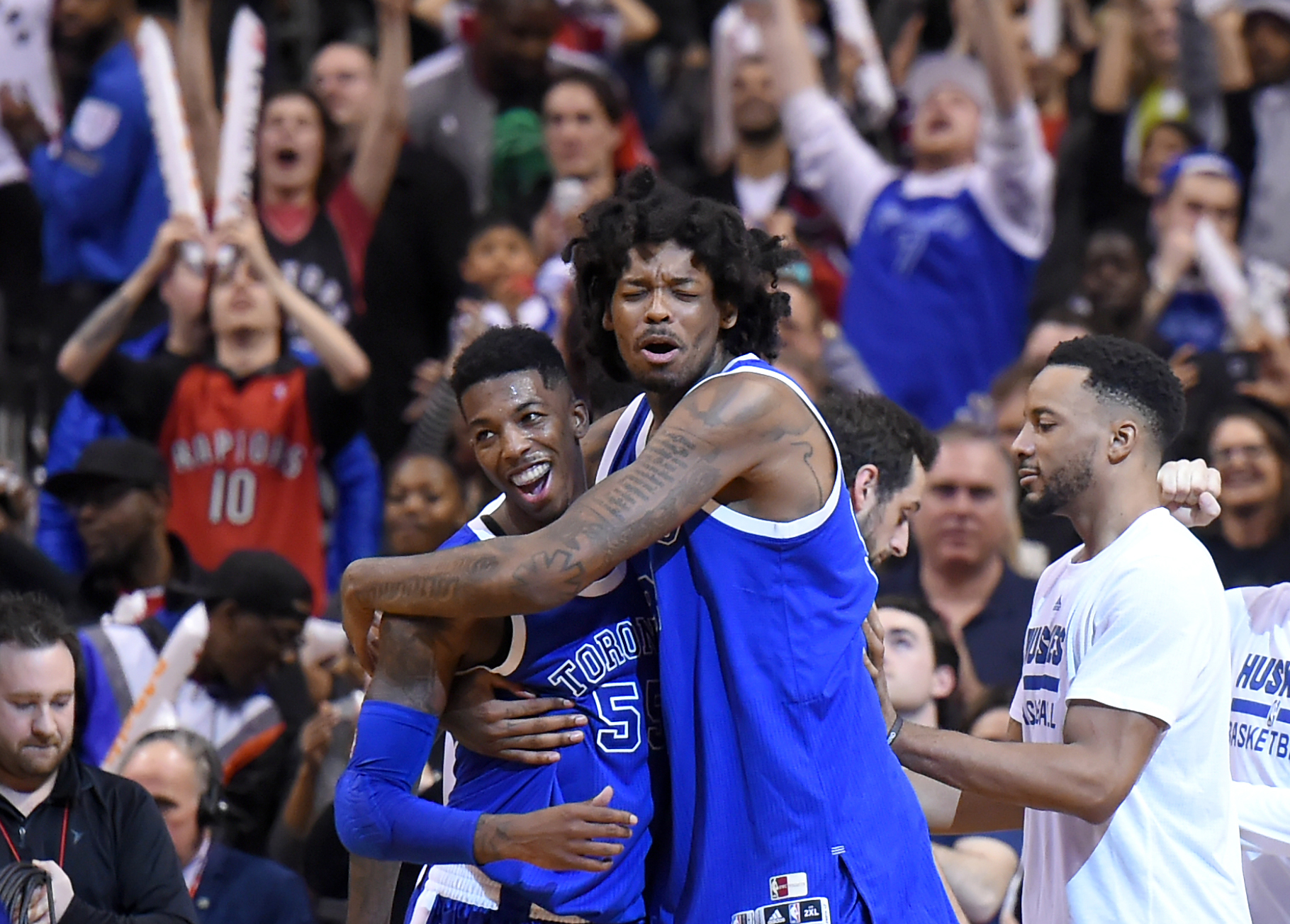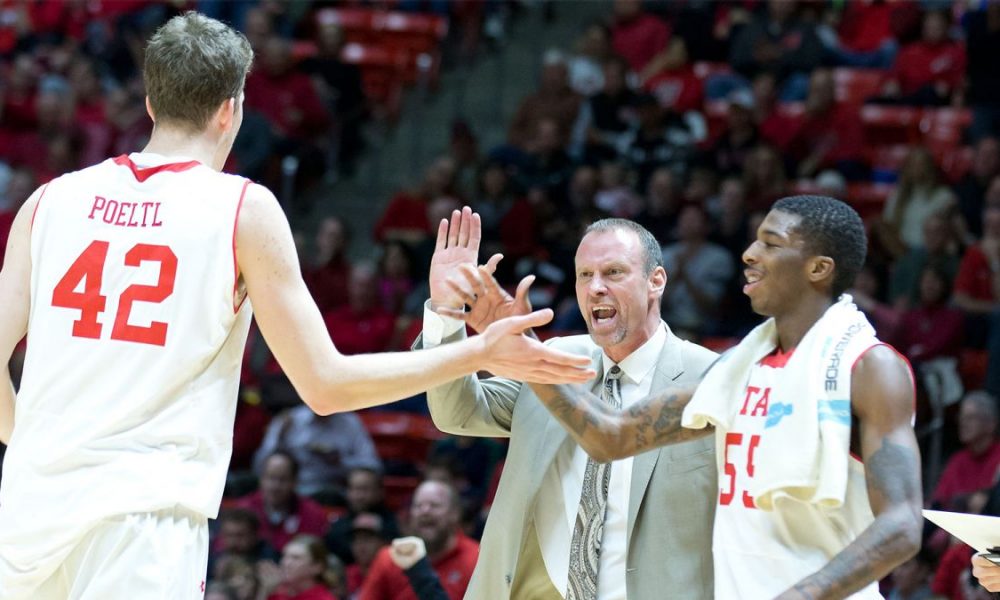A hoodie pulled over his thin frame, Delon Wright could not stop sweating. Under the beat of the light from multiple cameras, Wright’s shower hadn’t quite taken, and his customary nervous energy manifested in a beady brow as he struggled to give earnest answers to serious questions through a barrage of interruptions.
Lucas Nogueira reminded Wright that Jamaal Magloire had said the sophomore was “too cute to play in this league.” Jared Sullinger roared with laughter as Wright sheepishly credited a halftime shoe change with his fourth-quarter surge. Patrick Patterson looked on incredulously as Wright was handed a towel to combat the perspiration by a staff member. Norman Powell perked up with a “Huh? Space the floor?” when Wright tried to explain how his role changed playing with other point guards, jabbing at the biggest perceived weakness in his friend’s offensive game. Nogueira commandeered a microphone and slowly inched it closer to Wright’s face from afar before tapping him on the cheek and causing the entire scene to break down.
These scenes happen throughout the course of the NBA season. A locker room converges on a single target to razz them, to give them a hard time. It’s a rite of passage of sorts, especially when a player a little further down the depth chart contributes and gets the so-called podium game treatment. Fred VanVleet got accused of being “big time” when he had his first. Nogueira was “graduated” from the group that normally defines the end of the bench. Later, Jakob Poeltl would have to conduct an interview with Nogueira literally breathing down his neck. The goofiness is a celebration of a player’s emergence, a not-so-implicit nod that a young player has done well. Often, the players deep in the rotation are complicit in these shenanigans.
“It’s a good thing,” Wright explains. “I’m not the guy that likes the attention like that, so I get a little shy. But when they’re playing good, I mess with them a lot. I haven’t had too many games where I was able to show what I can do.”
These moments have been somewhat rare over the last two months, though. A breakout performance in a loss isn’t cause for positive energy, and more often than not, the Raptors’ locker room in 2017 has been quiet and sullen. For a significant portion of Wednesday night, it appeared that would be the story once again – the Raptors were well on their way to losing a fourth consecutive game, one that would have dropped them to 32-25 entering the All-Star break, all of their hopes during a long mental reprieve being pinned to the acquisition of Serge Ibaka and the return of Patrick Patterson. A win wouldn’t change how poorly the Raptors have played over their last 27 games, but it would at least offer the relief of wrapping the unofficial first half (first two-thirds, really) on a note that’s not cause for widespread panic.
Cue Wright and Poeltl in the fourth quarter, keying the unlikeliest of comebacks in the unlikeliest of lineups. Stretching for any spark at all, head coach Dwane Casey tabbed three point guards, DeMarre Carroll, and Poeltl to provide a change in energy. The specifics of the comeback aren’t really all that important, however fun they were. What was more striking was how the simple formula of five guys who seemed to genuinely care, who weren’t willing to accept defeat, and who played a wholly team-first game stood in such stark contrast to the bulk of the Raptors lineups since things went south on Dec. 28. As the Charlotte Hornets continued to pile up missed shots, the Raptors kept pushing the pace, sharing the ball, getting into ball-handlers, and generally playing the annoying brand of basketball that once defined them as one of the league’s up-and-coming pests. Wright was an enormous factor at both ends, and Poeltl was as solid as has come to be expected, capping things with a beautiful pass on the dive for Carroll’s game-sealing triple.
All throughout the comeback, the Raptors bench was ridiculous. First they got loud. As a small run turned into a 15-0 run, they got active, jumping out of their seats with every make and every stop. As the run extended to 24-2 and the Raptors took the lead back, every possession resulted in a wave-like eruption from the sidelines. Wright was all smiles. Poeltl was all screams. Lowry played the proud floor general slash father figure. Nogueira brought the hugs. And Casey kept trusting them, eschewing the normal urge to bring starters and stars back into the mix once the game got close.
DeMar DeRozan was perhaps the least demonstrative on the bench, sitting the entire fourth quarter. That doesn’t mean he wasn’t a big part of the support, though. DeRozan is not a particularly demonstrative guy in general, and his support was more subtle. After the Hornets called a timeout to try to stop the bleeding, DeRozan pulled Wright aside and let him know that this was his comeback to run with.
“It helps. As I was in there, DeMar was telling me don’t worry about coming out, coach is sticking with you right now, so just continue to play hard. He was encouraging me, so it felt good,” Wright said.
Casey’s decision to keep DeRozan shelved ruffled no feathers. Maybe DeRozan was frustrated with his own performance, which would be justified. From a team perspective, though, DeRozan was as happy as anyone to see things turn out the way they did, lighting up after the game when asked about Wright’s growth over a season-and-a-half.
“He just understands what he can do, his abilities, being creative with the ball, using screens, one-on-one, getting to the basket,” DeRozan said. “He’s got great size and length to him on both ends and he’s got a knack defensively for that ball. It sucks that he had to sit out half of the season with injury, but something like this is good.”
Something like this is good. But something like this is also hard. Depth is incredibly important over 82 games, but depth isn’t stationary. Players are humans, and sitting in wait for an opportunity is not an easy task. The job description is to stay ready, and players don’t necessarily deserve pats on the shoulders for doing so. Assuming they can and will, though, is unrealistic, and so it can be a gamble to call out a player’s number when it’s been games – in Wright’s case, almost an entire calendar year – since they’ve gotten action. The speed of the NBA game is tough enough to adjust to as a young player, and even occasional spot minutes if you’re Poeltl or D-League minutes if you’re Wright might not prepare you. Being deep in the rotation is a difficult mental and physical place to exist and thrive.
That the Raptors have solid depth isn’t a secret. Wright’s been healthy for a month and waiting for the opportunity that’s come the last two games. Poeltl’s played well enough when called upon as the third center that he’s been used out of position at the four to try to plug a gaping hole at the team’s thinnest spot. After the break, it’s unlikely these two players figure to be major rotation pieces any longer, but Casey will know he can lean on them if necessary. (To be clear, Wright probably figures in as the team’s third point guard and fourth wing if they don’t make another deal, which would put him in the pre-Ibaka trade Powell role as the spot-duty 10th man.)
The other difficult thing about depth is that, while it is objectively a good thing, its existence over a long season can lead to overthinking. Maybe a player on the bench too long will atrophy. A third-string playing well is cause for him to jump the back-up. Strength at one position should be dealt to fix a weakness elsewhere. With competing goals for the longer term, rotations are not always strict meritocracies, and the human nature of players makes constant juggling or reactionary changes untenable on a day-to-day basis. Depth, then, sometimes only exists on paper, and appreciating it – and the uncertainty of its necessity – isn’t always a straightforward mental exercise.
But it’s going to be needed at some point. The season is long. Players struggle. The postseason takes all bets off in terms of presumed roles (see: Indiana, Game 5). Performances like the ones turned in by Wright and Poeltl on Wednesday lend faith to that depth and make it easier and easier to lean on it, if necessary. Dormancy has not taken a toll on the Raptors’ young players, and while they’ll probably need to fight it off once again when the team’s back to full health, confidence should be high that they will.
As Wright wiped his face one more time, Sullinger used a high-pitch squeal to mock him in good nature. “I’m nerrrrrrvous.”
Maybe in front of the cameras, sure. That didn’t carry over to the court Wednesday, though, and the Raptors can enter the break with a weighty exhale because of it.




